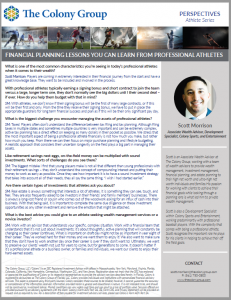Financial Planning Lessons You Can Learn From Professional Athletes
What is one of the most common characteristics you’re seeing in today’s professional athletes when it comes to their wealth?
Scott Morrison: Players are coming in extremely interested in their financial journey from the start and have a great knowledge base. They want to be included and involved in the process.
With professional athletes typically earning a signing bonus and short contract to join the team versus a large, longer term one, they don’t normally see the big dollars until their second deal – if ever. How do you help them budget with that in mind?
SM: With athletes, we don’t know if their signing bonus will be the first of many large contracts, or if this will be their first and only. From the time they receive their signing bonus, we have to put in place the appropriate guardrails for long term financial success and plan as if this will be their only significant pay day.
What is the biggest challenge you encounter managing the assets of professional athletes?
SM: Taxes! Players often don’t understand the difference between tax filing and tax planning. Although filing taxes in multiple states and sometimes multiple countries is very important and can be extremely complex, active tax planning has a direct effect on keeping as many dollars in their pocket as possible. We stress that the most important aspect of being a professional athlete financially is not how much you make, but rather how much you keep. From there we can then focus on major purchase planning and lifestyle budgeting. A realistic approach that considers their uncertain longevity on the field plays a big part in managing their assets.
Like retirement savings nest eggs, on-the-field money can be multiplied with sound investments. What sorts of challenges do you see there?
SM: The biggest mistake I find that young players make is not all that different than young professionals with their retirement savings – they don’t understand the concept of compounding interest and putting their money to work as early as possible. Once they see how important it is to have a sound investment strategy that takes into account all of their needs, they all say the same thing, “I wish I had started earlier.”
Are there certain types of investments that athletes ask you about?
SM: Real estate is always something that interests a lot of athletes. It is something they can see, touch, and feel. They are also frequently asked to be investors in their friends’ and family members’ businesses. There is always a long-lost friend or cousin who comes out of the woodwork asking for an influx of cash into their business. With that being said, it is important to complete the same due diligence on these investment opportunities as any other investment and remove the emotion that might be attached.
What is the best advice you could give to an athlete seeking wealth management services or a novice investor?
SM: Work with an advisor that understands your specific, complex situation. Work with a financial team that understands that it’s not just about investments; it’s about thoughtful, active planning that will constantly be changing as their career continues. What is important on draft day might not be as important in year eight of their career. They’ve worked hard for their money and we want them to enjoy it! We also want to make sure that they don’t have to work another day once their career is over if they don’t want to! Ultimately, we want to preserve our clients’ wealth not just for years to come, but for generations to come. It doesn’t matter if it’s a professional athlete or a business owner, or families and individuals, we want our clients to enjoy their hard-earned assets.


